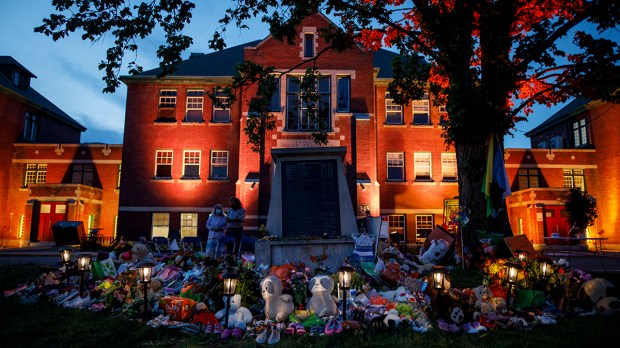The Catholic Church in Canada has issued a formal apology to the Native Peoples of Canada for its involvement in the government-run residential schools, which took extreme measures to assimilate Native Peoples into Canadian society in the 19th and 20th century.
The issue of the residential schools came to the fore this past year with the publicity surrounding the graves of Native students who had died at some of the residential schools. The publicity was followed by fires in several Catholic churches, which were suspected to be cases of arson.
“We, the Catholic Bishops of Canada, gathered in Plenary this week, take this opportunity to affirm to you, the Indigenous Peoples of this land, that we acknowledge the suffering experienced in Canada’s Indian Residential Schools,” said the apology, issued on Friday by the Canadian Conference of Catholic Bishops. “Many Catholic religious communities and dioceses participated in this system, which led to the suppression of Indigenous languages, culture and spirituality, failing to respect the rich history, traditions and wisdom of Indigenous Peoples. We acknowledge the grave abuses that were committed by some members of our Catholic community; physical, psychological, emotional, spiritual, cultural, and sexual. We also sorrowfully acknowledge the historical and ongoing trauma and the legacy of suffering and challenges faced by Indigenous Peoples that continue to this day. Along with those Catholic entities which were directly involved in the operation of the schools and which have already offered their own heartfelt apologies, we, the Catholic Bishops of Canada, express our profound remorse and apologize unequivocally.”
The residential school system took children away from their families and placed them in boarding schools, many of them run by religious organizations — both Catholic and non-Catholic — and forced them to abandon their native language and culture. There apparently also was abuse of children at the schools. Tuberculosis and other communicable diseases led to the early deaths of many, but many families never recovered the bodies of their children or were fully informed about what happened to them.
This week, the Canadian Bishops’ Conference said it is “fully committed to the process of healing and reconciliation.”
“Together with the many pastoral initiatives already underway in dioceses across the country, and as a further tangible expression of this ongoing commitment, we are pledging to undertake fundraising in each region of the country to support initiatives discerned locally with Indigenous partners,” the apology said. “Furthermore, we invite the Indigenous Peoples to journey with us into a new era of reconciliation, helping us in each of our dioceses across the country to prioritize initiatives of healing, to listen to the experience of Indigenous Peoples, especially to the survivors of Indian Residential Schools, and to educate our clergy, consecrated men and women, and lay faithful, on Indigenous cultures and spirituality. We commit ourselves to continue the work of providing documentation or records that will assist in the memorialization of those buried in unmarked graves.”
The statement continued:
Having heard the requests to engage Pope Francis in this reconciliation process, a delegation of Indigenous survivors, Elders/knowledge keepers, and youth will meet with the Holy Father in Rome in December 2021. Pope Francis will encounter and listen to the Indigenous participants, so as to discern how he can support our common desire to renew relationships and walk together along the path of hope in the coming years. We pledge to work with the Holy See and our Indigenous partners on the possibility of a pastoral visit by the Pope to Canada as part of this healing journey.
“We commit ourselves to continue accompanying you, the First Nations, Métis and Inuit Peoples of this land,” the bishops conclude. “Standing in respect of your resiliency, strength and wisdom, we look forward to listening to and learning from you as we walk in solidarity.”

